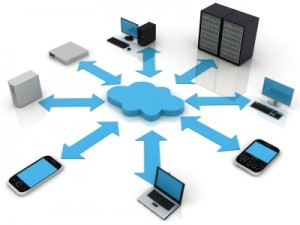(image courtesy digitizor.com)
Everything seems to be going into “the cloud” these days. You might be thinking it’s quickly become one of those meaningless phrases like “Web 2.0” which seem to mean everything and nothing at the same time.
Yet, cloud computing is the latest buzz term for good reason. It’s going to play a huge role in the future of tech and how we, as average consumers, live and work on a daily basis. Let’s try to briefly wrap our heads around just what exactly this cloud is and how we are suppose to compute in it…
The cloud being referred to is the internet. It’s out there…somewhere…vast and a bit fuzzy around the edges. The computing bit refers to us (IT people and the average consumer alike) storing our data, services and programs on the internet instead of our PCs or company servers via a new type of company that provides cloud computing services. From an IT perspective cloud computing is “a way to increase capacity or add capabilities on the fly without investing in new infrastructure, training new personnel, or licensing new software. Cloud computing encompasses any subscription-based or pay-per-use service that, in real time over the Internet, extends IT’s existing capabilities.” (Knorr & Gruman, InfoWorld) And there’s an entire vocabulary to learn such as Saas, Utility Computing, Web Service, Platform as Service, MSP, and more which all allow companies to push out their services more energy and cost efficiently for both them and their consumers. For more information on how cloud computing can benefit businesses and IT professionals, see Knorr & Gruman article mentioned above.
Most people want to know how cloud computing will impact us on a personal level. What does it mean to store all our data on in the cloud and how will that change the way we live and work? Storing all our data on the web means that we will no longer need to store data like documents, photos, music and videos on our personal computers. You will store all these items in your personal cloud which will then be accessible from any cloud client. A cloud client consists of hardware and/or software which runs applications made available through the cloud. A cloud client could be your computer, smart phone, operating system or browser. A cloud client could be said to be essentially useless if it’s unable to access applications to run via the cloud. Your web browser is a cloud client when it accesses Dropbox (the application) to get all your saved files. It doesn’t have the files you want itself, but it can run the Dropbox program to allow you to access those files Dropbox is storing in the cloud. Cloud computing eases the burden of your own computer by outsourcing the difficult (complex, memory-consuming) tasks to programs running on virtual servers in the cloud. Instead of having to store your data and the Dropbox software application on your computer, your browser simply sends a request and the cloud does the work and returns the data.
From the Dropbox reference, you can probably tell you are already using web services provided via the cloud. Essentially anyone using a computer is. Right now the ways the average consumer is utilizing the cloud is fairly limited, or at least, fairly disjointed. We utilize the cloud when we use our Gmail or Google Docs accounts. When we access our music from virtually anywhere with Spotify. When we communicate with family and friends over Facebook. All of these services are in the cloud. For consumers they are available anytime and anyplace there is an internet connection and require little to no hardware or software installation. While these services are extremely convenient for consumers, they lack the connectivity and continuity between them that the future of cloud computing promises.
In the future, all our devices will be connected to all of our data and all of the internet. We’ll be able to access and share data from work, university, social networks, bank accounts, hospital records, email and just about anything else you can think of. There are already some companies offering personal cloud services, such as Amazon’s Cloud Drive and Apple’s iCloud, but right now these are mainly online storage vaults. Convenient to be sure, but experts tell us to envision not just being able to access our documents from anywhere, but using cloud service providers to search, add, edit, share, cross-reference and organize our data, regardless of whether it’s on our personal PC, the cloud, or someone else’s cloud. It will make research and collaboration between different parties easier and much quicker. Of course, all this information in the cloud will also require very strict privacy regulations to ensure only what you want to share can be accessed. But that’s another topic for another day.
In short, cloud computing will make it easier for companies to grow and offer services as they outsource IT operations to cloud computing providers. It will make consumers’ lives easier as we can access our data from anyplace at anytime as personal clouds become more common.


